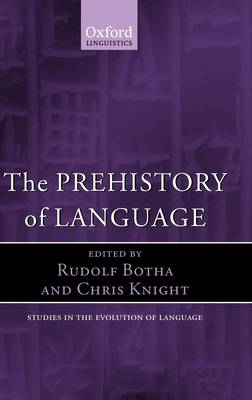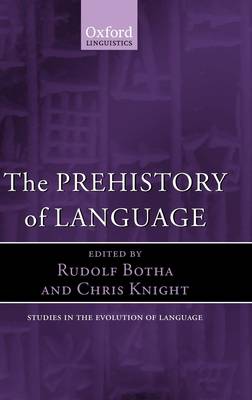
Je cadeautjes zeker op tijd in huis hebben voor de feestdagen? Kom langs in onze winkels en vind het perfecte geschenk!
- Afhalen na 1 uur in een winkel met voorraad
- Gratis thuislevering in België vanaf € 30
- Ruim aanbod met 7 miljoen producten
Je cadeautjes zeker op tijd in huis hebben voor de feestdagen? Kom langs in onze winkels en vind het perfecte geschenk!
- Afhalen na 1 uur in een winkel met voorraad
- Gratis thuislevering in België vanaf € 30
- Ruim aanbod met 7 miljoen producten
Zoeken
The Prehistory of Language
€ 354,45
+ 708 punten
Omschrijving
'When, why, and how did language evolve?' 'Why do only humans have language?' This book looks at these and other questions about the origins and evolution of language. It does so via a rich diversity of perspectives, including social, cultural, archaeological, palaeoanthropological, musicological, anatomical, neurobiological, primatological, and linguistic. Among the subjects it considers are: how far sociality is a prerequisite for language; the evolutionary links between language and music; the relation between natural selection and niche construction; the origins of the lexicon; the role of social play in language development; the use of signs by great apes; the evolution of syntax; the evolutionary biology of language; the insights offered by Chomsky's biolinguistic approach to mind and language; the emergence of recursive language; the selectional advantages of the human vocal tract; and why women speak better than men.
The authors, drawn from all over the world, are prominent linguists, psychologists, cognitive scientists, archaeologists, primatologists, social anthropologists, and specialists in artificial intelligence. As well as explaining what is understood about the evolution of language, they look squarely at the formidable obstacles to knowing more - the absence of direct evidence, for example; the problems of using indirect evidence; the lack of a common conception of language; confusion about the operation of natural selection and other processes of change; the scope for misunderstanding in a multi-disciplinary field, and many more. Despite these difficulties, the authors in their stylish and readable contributions to this book are able to show just how much has been achieved in this most fruitful and fascinating area of research in the social, natural, and cognitive sciences.
The authors, drawn from all over the world, are prominent linguists, psychologists, cognitive scientists, archaeologists, primatologists, social anthropologists, and specialists in artificial intelligence. As well as explaining what is understood about the evolution of language, they look squarely at the formidable obstacles to knowing more - the absence of direct evidence, for example; the problems of using indirect evidence; the lack of a common conception of language; confusion about the operation of natural selection and other processes of change; the scope for misunderstanding in a multi-disciplinary field, and many more. Despite these difficulties, the authors in their stylish and readable contributions to this book are able to show just how much has been achieved in this most fruitful and fascinating area of research in the social, natural, and cognitive sciences.
Specificaties
Betrokkenen
- Uitgeverij:
Inhoud
- Aantal bladzijden:
- 368
- Taal:
- Engels
- Reeks:
- Reeksnummer:
- nr. 11
Eigenschappen
- Productcode (EAN):
- 9780199545872
- Verschijningsdatum:
- 22/06/2009
- Uitvoering:
- Hardcover
- Formaat:
- Genaaid
- Afmetingen:
- 156 mm x 234 mm
- Gewicht:
- 689 g

Alleen bij Standaard Boekhandel
+ 708 punten op je klantenkaart van Standaard Boekhandel
Beoordelingen
We publiceren alleen reviews die voldoen aan de voorwaarden voor reviews. Bekijk onze voorwaarden voor reviews.








